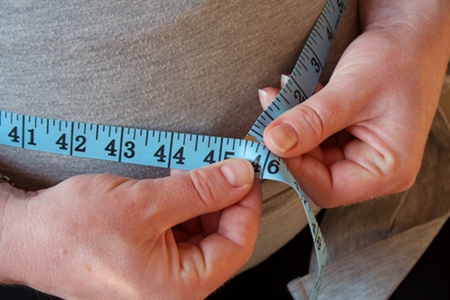Lose 20 Pounds in 4 weeks with Advice from the Metabolism Whisperer
On a recent episode of The Dr. Oz Show, Dr. Oz introduces nutritionist Haylie Pomroy who many women reverently refer to as “the Metabolism Whisperer” for her uncanny success at helping women reshape their bodies with a food-as-medicine focus on health that can raise your metabolism, burn your fat, and help you lose 20 pounds in 4 weeks.
“I light a match inside of you to ignite your fat burn,” says Haylie Pomroy who claims that with her advice she can get any woman out of a metabolism slump. “I look at your diet, your weight, your habits, and even your blood work to create what works for you and your busy life. My cure―food. I don’t count calories, I don’t measure fat, and you get to eat what you love. Food is medicine. And when taken correctly, it can help you unwind stress, unlock the fat stores and unleash the burn.”
Dr. Oz tells viewers that one of the biggest reasons why women can’t lose weight like they used to when they were younger is due to that their metabolism has gone into a slump. This slump is caused by changing hormones, their diet and common bad habits that we pick up in life.
To help women identify whether their body is in a metabolism slump, Dr. Oz’s special guest has created a metabolism checklist outlined below that you can use to evaluate your metabolism condition.
METABOLISM CHECKLIST
1. Have you had your thyroid and estrogen levels tested?
According to Ms. Pomroy, everyone knows that your thyroid hormone levels can affect your metabolism; and as such, doctors typically test a woman’s TSH, T3 and T4 hormone levels, but not her “Reverse T3” hormone levels.
Reverse T3 thyroid hormones are “misshapen” thyroid hormones that do not work well with thyroid hormone receptors in the body, and as a result adversely affects your thyroid and normal hormone levels. Signs that your body has this include brittle hair and cracks in the skin on the heels of your feet. If you have elevated Reverse T3 levels, Ms. Pomroy says that this can be remedied by eating selenium and iodine rich foods such as kale and seaweed.
“These are great things to tickle your metabolism,” says Ms. Pomroy.
A problem with estrogen hormone exams is that doctors typically only have the levels of estradiol checked. According to Ms. Pomroy, when having your estrogen levels checked, ask that they also look at your estrone levels. Estrone is what is referred to as a compensating hormone that is secreted by fat cells and the adrenals when estrogen levels begin to drop―especially during peri-menopause and menopause, which results in fat storage around the middle giving women a muffin-top body shape.
To treat elevated estrone levels, Ms. Pomroy recommends eating cruciferous vegetables such as kale, broccoli and asparagus.
2. Have you tried more than 3 different diets in the past year?
“With every restrictive based diet you are on, you can consider your metabolism reduced by a good 20 percent each time you do that,” says Ms. Pomroy who explains that the problem with the majority of the diets is that they are restrictive diets that say you need to exclude carbs, or exclude fats and proteins, or exclude whatever is currently in vogue at the time. However, doing this multiple times a year subjects your metabolism to a restriction diet assault that essentially lowers your metabolism further with each dieting attempt.
3. Do you eat a fat-free diet food in at least one meal per day?
“I always say, ‘If it’s fake, take a break’ or ‘If it’s free—don’t buy it,’” says Ms. Pomroy. Her point about eating fat-free diet foods is that often times they contain what she refers to as “obesegens” ―chemicals that encourages the body to store fat in other ways when you attempt to starve it of natural fat in foods.
4. Do you eat the same types of foods every day?
“Your metabolism is actually geared by the food you take in,” says Ms. Pomroy who explains that eating the same types of food every day puts your body in a metabolic rut where your metabolism is no longer challenged to deal with different types of foods. This lack of challenge she says actually leads to a slowing down of the metabolism because the same enzymes are working on breaking down the same foods and eventually a type of resistance builds up where your metabolism is not working as well as it should.
-
Can Hoodia Slim You Down
Hoodia for weight loss...60 Minutes, the BBC, the Today Show, and much
-
DUKAN DIET: FAD, FRAUD OR FACTUAL
America has an abundant supply of two things oil and fad diets. Wee
-
Weight Loss Hypnotist, Dr. Lewis Heller
Here are the Facts: Obesity is an ever increasing problem for OUR na
-
A Couple Of Ideas To Help You Achieve To Your Weight Loss Goals
Although exercise and diet is very important in relation to weight los
-
5 Super Simple Weight Loss Tips
Weight loss is one of those subjects that everyone is always talking
-
Weight Control Program Tips Lose Weight Safely
Losing weight is one of the major health concerns nowadays. That is w
- DON'T MISS
- The Help You Need to Lose Weight Now
- Excess Belly Fat is Not Only Ugly, but Very Dangerous to Your Health
- Adding Hoodia to Your Diet
- How To Shed Weight In 7 Days
- Is The Biggest Loser making us fatter?
- Tell me about the diabetes drugs Byetta, Victoza and Bydureon. Can they really help people who have diabetes lose weight? Are there side effects?
- Actual Fats Loss four Idiots Review
- Its Easy To Start Living Off The Grid
- Speedy Weight Loss StrategiesRapid Weight Loss Methods
- Fact or Fiction: Eating Breakfast Can Help You Lose Weight




